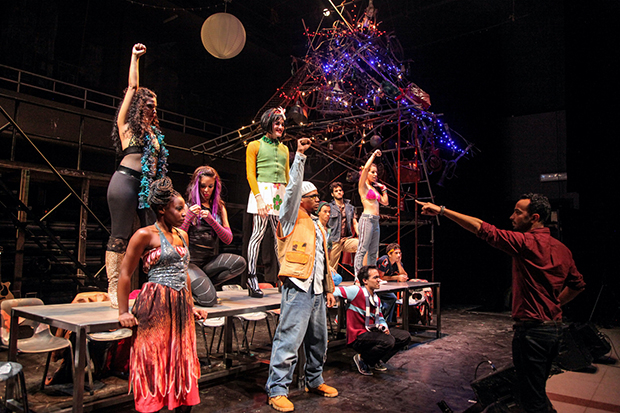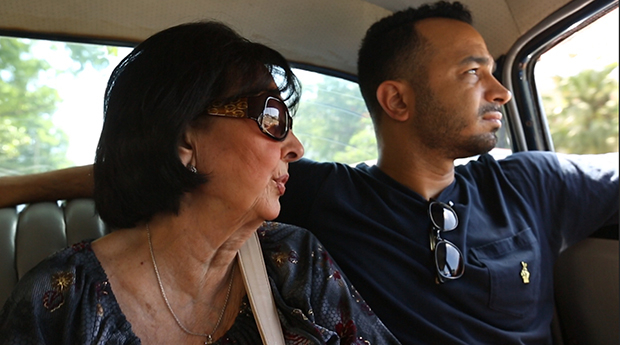Interview: Andy Señor Jr.'s Journey to Bring Rent to Cuba
Señor shares his story in the new HBO documentary ”Revolution Rent”.
In 2014, Andy Señor Jr. embarked on a journey he never expected: He would bring Jonathan Larson's beloved musical Rent to Cuba.
Then again, his entire Rent journey has been unexpected. A grad school audition for original director Michael Greif led to Señor playing Angel on Broadway and the West End, and acknowledging his desire to assist Greif on the show's off-Broadway revival led to his putting up the production throughout Asia. But the chance to take it to Cuba — his ancestral homeland, which his parents fled before landing in Miami decades earlier — was one he knew he couldn't pass up, even if it went against his and his family's better judgment.
Rent marked the first Broadway musical co-production between the United States and the Cuba in 50 years, and, in the country's thriving political theater scene, sold out for four months. Señor documented his experiences in the new film Revolution Rent, which premieres tonight at 9pm on HBO (and streams thereafter). Here, he takes us through the process, and tells us why, after certain initial misgivings, he can't wait to go back.

(© Carlos E. Gonzalez/HBO)
Take me through the evolution of your Rent journey.
The first time Rent popped into my head was watching Wilson Jermaine Heredia win the Tony for playing Angel. For a theater kid, Hispanic and in Miami, that was the first time that I saw someone Hispanic that was close to my age on the Tonys. I was like, "Whoa, what is this show?" I became obsessed with the album, when I was auditioning for graduate school at University of California San Diego, and Michael Greif was sitting there, because he was the artistic director of the La Jolla Playhouse.
I was like, "Mr. Greif, I'm obsessed with Rent," and he says, in his very Michael way, "Good. What monologues are you going to do?" He gave me a callback, and then, as he was leaving the room, I went up to him and was like, "I would really love to audition for Rent." And he's like, "Can you sing?" And I said to him, "Like a bird." And he says, "Oh. You need to call Bernie Telsey's office immediately and give them your information and make sure we know where to reach you."
Two weeks later, I was in New York City auditioning for the show. I sang "I'll Cover You" and "Today 4 U" and they're looking at me smiling. It was wonderful. I flew back home the next morning, I took a nap, and an hour later, they called and offered me the job. I did the national tour first, then I did the West End company, and then I did the Broadway company for two years, left for nine months, and came back for two years. You know how it was, we were always rotating in and out.
After we did the farewell tour with Adam Pascal and Anthony Rapp, I knew that they were going to do the off-Broadway revival and I told Michael that I wanted to work with him on it. He already had an assistant, Billy Porter, so it was Billy and I. Japan bought the rights to do that production and Michael sent me to put it up in Japan. I'd never directed, much less directed a show that was double-cast, and in Japanese. That began the process of my putting the show up all over the place. I've done it in English, Spanish, Japanese, and Korean so far.
Knowing your family's history, tell me about the emotions that came with going to Cuba to put up Rent. Were you reluctant? Were they?
They were incredibly reluctant. The sane part of me was very reluctant. I grew up in Miami, and it was known in the community that you don't go to Cuba, you don't engage with the government, you don't cross that line. And for the most part, it was like, "Yeah. But Rent, we're gonna go. That's gonna happen." I'll go wherever I have to go to put up Rent. Had it been something else, then maybe I would have reconsidered or had more turmoil about it. But to put up this show? Absolutely going to happen. I think what my mom was most afraid of was…Definitely that something was gonna happen to me, but she knew that the offer to put up Rent in Cuba, there was nothing she could say that could make it go any other way. That's what her fear was. There's no argument that anyone in the world can make for me to not go.

(© HBO)
At what point did you decide to make a documentary about your experiences staging the show in Cuba?
When we did that farewell tour, I filmed the entire thing and was doing a food blog. I was always filming and/or taking photos. That's just Andy doing what Andy does. That being said, when I did the show in London, the Admiral Duncan, which is a gay bar, was bombed right as we were having lunch around the corner. When I was doing the show in New York, it was 9/11. When we did an Asia tour, it was the bird flu. When I said "OK, I'm gonna go do this in Cuba," a communist country, I didn't know what's gonna happen, so I decided to take a camera and see how it goes. When I started to get to know the cast, and when things started unfolding politically with the normalization talks, I realized it was a documentary. But I was never like, "I'm gonna be a documentary filmmaker." I don't have an agenda about this. I think it's clear to everyone in the world that I love this show, and my experiences, and my culture, and my family. I'm sharing what I love. It captures what it was. I felt like Mark.
Are there other shows that you want to put up in Cuba? Is there a big theater community there?
There is no musical-theater community, but there is a huge theater community. That's what I learned when I got there. There are over 90 theater companies in Havana alone, and people go see theater. Rent was sold out the entire four months that we ran. And it's provocative theater — much more edgy than Rent, and it's political. And this is a place where you can't freely express your opinions and thoughts, so you put it inside your political pieces and then do it onstage. I'm anxious to continue to work in Cuba with the actors. I want to develop shows there that are telling Cuban stories. As far as bringing an American Broadway show over, for some reason, the one that sticks in my head is The Color Purple. I think it would be really interesting to do. People want to do Hair, but Color Purple is on the forefront of my mind there.
Why do you think that Rent, a show which is very much about a specific time and place and aspect of American history, transcends the cultural barriers with the enthusiasm that it does?
First, those melodies are haunting. There's so much emotional memory that I have, just in, like…the introduction to "Halloween." But for other people, who are outside of that, I think Jonathan put so much of himself – of his pain, of his love, of his friends — in that music, in those words, and it's captured there.







